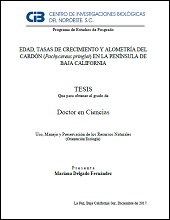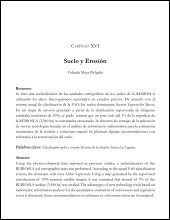| dc.contributor | PEDRO PEÑA GARCILLAN | |
| dc.contributor | EXEQUIEL EZCURRA REAL DE AZUA | |
| dc.creator | MARIANA DELGADO FERNANDEZ | |
| dc.date | 2017-12 | |
| dc.identifier | http://cibnor.repositorioinstitucional.mx/jspui/handle/1001/864 | |
| dc.identifier.uri | http://dspace.cibnor.mx:8080/handle/123456789/2363 | |
| dc.description | "El cardón (Pachycereus pringlei) es una cactácea columnar endémica del Desierto Sonorense que se distribuye a lo largo de más de 1000 km en la Península de Baja California, en un gradiente de precipitación latitudinal, que va de los 518 a los 55 mm de precipitación media acumulada anual. Este estudio pone a prueba la factibilidad de estimar la edad de una planta suculenta que no presenta anillos de crecimiento utilizando técnicas radioisotópicas, aborda cómo varían los patrones individuales de crecimiento y describe la variación morfológica de esta especie a lo largo del gradiente donde se distribuye. Para ello, se seleccionaron seis sitios de la latitud 23°N a la 31°N; en cada sitio se estableció un cuadrado de 100 × 100 m, se contó el número de ramificaciones y se midió la altura y diámetro de cada cardón. En cada sitio se seleccionaron cuatro cardones de diferentes alturas y se colectó una espina de la areola más baja de su tallo central. Estimamos la edad de las espinas utilizando la datación por radiocarbono y estimamos su tasa de crecimiento. Se utilizó un modelo alométrico para analizar la relación diámetro–altura y se estimaron los parámetros a través de un modelo lineal. La altura del tallo central al momento en el que la primera ramificación emergió se estimó realizando una regresión lineal de la altura de la planta contra el número de ramificaciones laterales. Se utilizó un modelo de irradiación para estimar la radiación solar interceptada por un cardón sin ramificar de 6 m de altura. La tasa de crecimiento promedio fue de 0.098 m por año, con valores desde los 0.03 a los 0.23 m por año. La tasa de crecimiento anual promedio se correlacionó con la altura de la planta (r2 = 0.82, P < 0.0001) y ninguna otra variable ambiental del sitio, como la precipitación o la latitud, fue un predictor significativo. Concluimos que el diámetro de los cardones adultos, la proporción superficie-volumen y la altura del tallo central cuando los cardones comienzan a ramificar están asociadas a la latitud y a variables ambientales asociadas a la latitud como es la precipitación y que los métodos de radiocarbono son robustos y adecuados para explorar las tasas de crecimiento y demografía de las cactáceas columnares..." | |
| dc.description | "The cardon (Pachycereus pringlei) is a columnar cactus endemic to the Sonoran Desert that is distributed over more than 1000 km along the Baja California peninsula, its distribution extends along a latitudinal gradient of precipitation, which range from 518 to 55 mm of mean annual precipitation. This study addresses how the individual growth patterns and morphological variation of this species vary along the gradient where it is distributed. For this purpose, we selected six sites from latitude 23°N to 31°N, at each site a square of 100 × 100 m was established, the number of branches was counted and the height and diameter of each cardon was measured. In each site, four cardons of different heights were selected and a spine was collected from the lower areola of its central stem. We estimate the age of spines using radiocarbon dating and we estimated their growth rate by dividing the height of the central stem between the age (estimated by radiocarbon) of the cardon. The allometric model was used to analyze the diameter-height relationship and the parameters were estimated through a linear model. The height of the central stem when the first branch emerges was estimated by performing a linear regression of the height of the plant against the number of lateral branches. The solar radiation intercepted by an unbranched 6-m-tall cardon was estimated using an irradiance model. The average growth rate was 0.098 m per year, with values ranging from 0.03 to 0.23 m per year. The mean annual growth rate was correlated with plant height (r2 = 0.82, P < 0.0001) and no other environmental site variables such as precipitation or latitude were a significant predictor. We conclude that the diameter of the adult cardons, the surface area:volume ratio, and the height of the central stem when the cardons begins to branch are associated to the latitude and to environmental variables associated to the latitude as it is the precipitation, and that the methods of radiocarbon are robust and suitable to explore the growth rates and demography of the columnar cactus..." | |
| dc.format | application/pdf | |
| dc.language | spa | |
| dc.publisher | Centro de Investigaciones Biológicas del Noroeste, S.C. | |
| dc.rights | info:eu-repo/semantics/openAccess | |
| dc.rights | http://creativecommons.org/licenses/by-nc-nd/4.0 | |
| dc.subject | info:eu-repo/classification/AUTOR/cactácea columnar, Desierto Sonorense, tasa de crecimiento, patrones latitudinales, radiocarbono | |
| dc.subject | info:eu-repo/classification/AUTOR/columnar cacti, growth rate, latitudinal patterns, Sonoran Desert, radiocarbon | |
| dc.subject | info:eu-repo/classification/cti/2 | |
| dc.subject | info:eu-repo/classification/cti/24 | |
| dc.subject | info:eu-repo/classification/cti/2417 | |
| dc.subject | info:eu-repo/classification/cti/241702 | |
| dc.subject | info:eu-repo/classification/cti/241702 | |
| dc.title | Edad, tasas de crecimiento y alometría del cardón (Pachycereus pringlei) en la península de Baja California | |
| dc.type | info:eu-repo/semantics/doctoralThesis | |
| dc.type | info:eu-repo/semantics/publishedVersion | |


